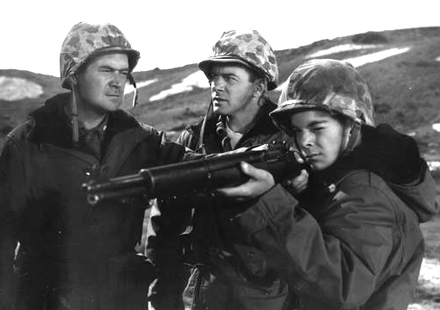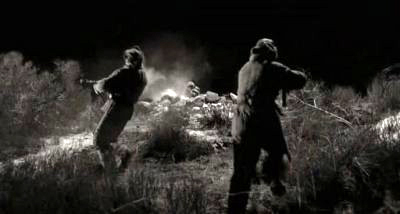
 |
|
|
|
Retreat, Hell! is a highly entertaining picture about ground combat in the Korean War, aka the U.N. Police Action. There weren't many made, as Hollywood had a hard time getting a handle on the conflict. Cold War posturing makes several of the better-known Korean War pictures almost unwatchable. One Minute to Zero is so fiercely anti-Communist that it forgets to tell a coherent story. Made several years later, Douglas Sirk's Battle Hymn adds religion to the mix, coming off (to this viewer) as something the Nazis might have produced had they won WW2. 
To its benefit, Retreat, Hell! is a straight drama fashioned along the lines of William Wellman's WWII classic Battleground. Made when the fighting was still going strong, it has its Gung Ho recruiting-poster moments. Yet I found it to be mostly honest about its subject. The script by Ted Sherdeman (Them!) takes the politics at face value, which is where the first-into-the-fray Marine Corps found itself in 1950. Thus, although the Corps is certainly being lauded, no dated attitudes crop up to push the movie into the anti-Commie camp category. The acting is top-notch, with star Frank Lovejoy highly charismatic for an actor most frequently tapped to play no-nonsense military men. Future science fiction fixture Richard Carlson puts a human face on the Corps. But the film's brightest asset is the 17 year-old Russ (Rusty) Tamblyn, former child actor (Gun Crazy) in his first non-kid part. Actor Richard Jaeckel had started a career playing The Green Recruit ten years before, but Tamblyn really excels as a fourth-generation leatherneck. Although it's usually passed over in discussions of Joseph H. Lewis's filmography, Retreat, Hell! is very smartly directed. The script is actually rather dry, but Lewis enlivens every scene and turns familiar situations into something special. It's better than most of the director's non-classic titles. Veteran Marine reservist Paul Hansen (Richard Carlson) and his wife Ruth (Anita Louise) try to take it in stride when he's pulled in for active duty in Korea. Paul is pleased to find that his C.O. is an old comrade, Lt. Col. Steve Corbett (Frank Lovejoy). But he's not happy when he's booted up to Captain and put in charge of his own company of Marines. The training is intense and Hansen and his troops are soon on their way to combat. The big shakedown comes when they make an amphibious landing at Inchon and fight their way inland. Fellow commander Tink O'Grady (future director Lamont Johnson) charges his troops into the fray, but Col. Corbett must ride Hansen to get him to press the offensive. Helping out considerably is Sgt. Novak (Oscar-winning writer Nedrick Young), another veteran of the South Pacific theater. At first almost embarrassingly enthusiastic, young Jimmy McDermid (Russ Tamblyn) excels in training but chokes up in combat. After the first day's fighting he wanders in from the rear, sheepish and ashamed. Jimmy finds out that his brother, a Marine officer, is at the command base, but won't go see him until he's fought like a real Marine. A couple of months later, the offensive is going so well that the rumors are that everyone will be going home for Christmas. That's when hordes of Chinese troops swarm onto the battlefield, overrunning the U.N. lines. Corbett is ordered to withdraw his men, but he refuses to simply run -- Corps policy in his battalion is to not leave s asingle man behind on the battlefield. 
Retreat, Hell! honors the Marine Corps and lauds their unenviable role in Korea without lecturing the audience or telling us what to believe. It does conceive of things in WW2 terms, which is understandable -- the kids of 1952 listen to older tunes on the radio, like "They're Either Too Young or Too Old" and "The Very Thought of You." The general message is that the Corps is a tough outfit and that only Real Men should apply. Paul Hansen is given grief for being insufficiently Marine: playing it too safe. Corbett's critiques of Hansen are very similar to the Nick Nolte / Elias Koteas scenes in The Thin Red Line, except that Corbett is understanding and reasonable to a fault. Hell of a commander, that Corbett: he speaks Korean (riiiight...) yet pronounces the city Seoul as, "sool". Corbett also gives Hansen grief for not knowing all of his men's names on sight. This leads to an interview scene in which Paul asks his men to turn around so he can memorize the backs of their heads. Rusty Tamblyn's Jimmy reacts to this in a way that's amusing. Now it seems like an unintended, slightly gay joke. I'm sure that the joke in my Air Force family would have Captain Hansen solve the problem by having his troops tattoo their names on the back of their necks. Tamblyn's character traverses the entire Red Badge of Courage story arc. Eager Jimmy McDermid sees his first dead man and can't function. He goes through a period of misery before stepping forward and making some smart moves in house-to-house fighting in Seoul. When he receives some bad news, Jimmy goes on a kill-crazy suicidal kick, volunteering to be on point at all times. Credit both Tamblyn and director Lewis for making these scenes compelling. Lewis of course directed Tamblyn at least once before, for the prologue to Gun Crazy. The kid is great -- I'm glad I wasn't 18 in 1952, or I might have tried to enlist. 1 At one point Tamblyn is ordered back from the action because he's become the "sole surviving son" in his family of Marine Corps professionals. Saving Private Ryan grossly oversells this idea, as if getting one Soul Surviving Son home free is worth the lives of fifty other mothers'. Mothers that start out with just one son in the fighting of course don't have this luxury, which makes the whole program into a "the Army has heart" PR program. In any case, Jimmy McDermid asks to spend his last night up on the front line with his buddies. That of course is when the Red Chinese attack (surge?) happens, out of the blue. The whole outfit must pull back and depend on timely munitions drops to keep from being overrun by a seemingly endless supply of enemy cannon fodder. It gets down to documented things like the Chinese ripping right into the soldier's tents and playing trumpet charges over loudspeakers. When their ammo runs out the Marines are told to 'fix bayonets'. 
Joseph H. Lewis' direction is clean, dynamic and fast-paced. His action scenes get a maximum out of the resources loaned by the Marine Corps to co-writer / producer Milton Sperling. Folmar Blangsted's snappy editing helps quite a bit as well. Much of the battle newsreel stock footage cut in to amp up the combat scenes is of superior quality. Even better, Lewis keeps the relationships between the fighting men on an intelligent level. Scenes never collapse into empty saluting and protocol, yet neither do the actors overdo anything. Lovejoy has a mean stare but is a stand-up guy; Richard Carlson seems less of a wimp than usual. Nedrick Young's sergeant is supportive of kids like Jimmy without letting the movie become schmaltzy, as happens in any John Ford picture about a "family military unit". When Jimmy is clearly in emotional agony, Young mostly watches from afar, letting the kid work it out for himself. The movie's last moments are sort of a billboard to the USMC, with a wounded Colonel Corbett willing himself to march with his troops. We wonder what a mess that shoulder wound will be when the morphine wears off. And let's hope that Corbett is good at making command decisions while high. Since Lewis doesn't milk this macho tough guy business, I say fair enough. As Paul Hansen's understanding wife, accomplished actress Anita Louise (the original Queen Titania in the classic A Midsummer Night's Dream) doesn't get much screen time. At one point he receives some mail from home and starts talking about his kids, which is just insane. Doesn't he know what happens to guys in war movies that take time out to talk about life back home, the old "someday I'll buy the farm" cliché? Paul Hansen just better watch out. Olive Films' Blu-ray of Retreat, Hell! is a terrific B&W HD transfer of this unheralded war picture that would be a natural for those Memorial Day let's-honor-veterans-by-watching-cool-war-movies TV marathons. Oh, right, war movies for 'Freedom & Glory' weekends need to be in color, and preferably with Clint Eastwood. Olive offers no extras and unfortunately no subtitles for the hearing-impaired, whom I fear have had to abandon classic films on disc almost completely. But the movie looks fine. As 1952 is definitely before the widescreen conversion, the aspect ratio on view is a proper 1.37:1.
On a scale of Excellent, Good, Fair, and Poor,
Retreat, Hell! Blu-ray rates:
Footnote:
1. Doing Right By Dad department: Seeing the cargo planes dropping supplies to the Marines prompts me to talk about my father, an Air Force Sergeant and a flight engineer based in Japan when the war broke out. They're the exact same kind of cargo plane he flew. On the first day of hostilities he was on one of the first supply planes to land in disputed territory, just to see if the front line airstrip had been overrun. His one war story of actually being shot at (that includes four years in North Africa, India and Burma during WW2) was when his cargo plane was riddled with small arms fire as they took off.
Reviews on the Savant main site have additional credits information and are often updated and annotated with footnotes, reader input and graphics.
Review Staff | About DVD Talk | Newsletter Subscribe | Join DVD Talk Forum |
| ||||||||||||||||||